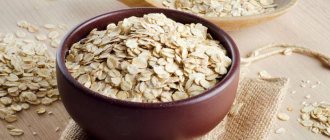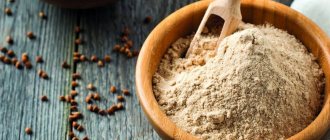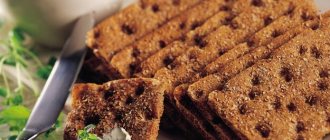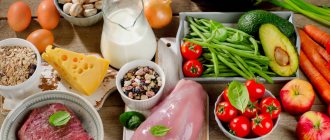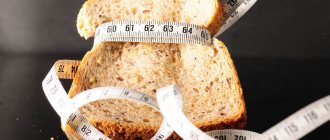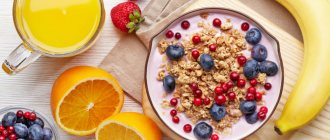What time do you have breakfast?
We’ve figured out why you need to eat in the morning, now let’s look at the optimal time for this.
The best time for morning meals is considered to be from 7.00 to 9.00 . It is during this period that the body absorbs foods best. Everything, of course, depends on what time you wake up.
Here's the best morning routine:
- woke up, brushed teeth;
- Drink one or two glasses of water at room temperature;
- After 20-40 minutes you can start your morning meal.
Try to eat at the same time every day to get your stomach used to eating. It needs 3-4 weeks to adapt to your routine, after which it will remind you of breakfast better than any clock.
If you don’t have an appetite in the morning, firstly, remember that it comes with eating, and, secondly, buy yourself a bright plate that can increase not only your appetite, but also your mood.
Don't eat breakfast right after waking up
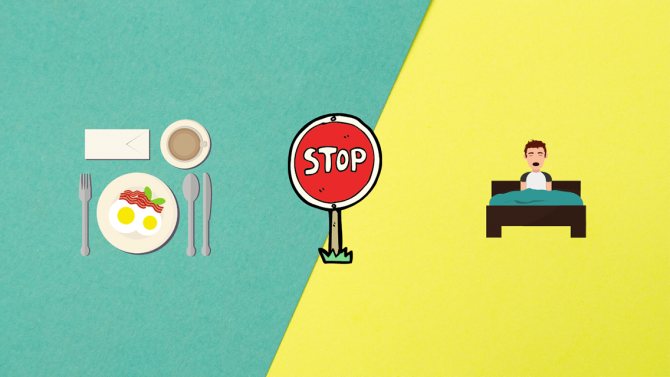
Why can't you eat immediately after waking up? Breakfast in bed is a cute idea, but not very healthy for your figure.
From a body chemistry perspective, it's helpful to give yourself at least half an hour of light exercise, a shower, and other morning rituals before rushing to the refrigerator.
You need to have breakfast half an hour after waking up . The ideal option is to drink a glass of water, do exercises, take a shower, and then eat.
This way, you will sit at the table with an obvious feeling of hunger, and the hormonal and digestive systems will have time to prepare to absorb breakfast one hundred percent.
Interesting facts about breakfast
Content:
- Interesting facts about breakfast
- Why is breakfast so important?
- What does a proper breakfast look like?
- How to choose breakfast foods
- How to train yourself to eat breakfast
- If you still don't want to eat
Many historians suggest that until the 15th century people did not eat breakfast: in ancient times it was customary to eat once a day, but very heavily. The meal in those days was reminiscent of a modern lunch. It is difficult to say when and in what connection the tradition of having breakfast appeared, but it is known for sure that at first the courts consumed bread, butter and cheese in the morning. Over time, the appetites of the nobles grew and after sleep, many began to eat fish or chicken dishes. Researchers also say that during the time of Henry IV, there were special rooms in the palaces intended for the morning meal. It is interesting that in those days, European nobles were served not tea or coffee, but wine or beer for breakfast. But Peter I, according to historians, was also a gourmet! In the mornings, the Russian emperor liked to drink hot chocolate. And Catherine the Great’s breakfast was completely reminiscent of a modern one – a cup of coffee and toast. By the way, the fashion for eating cereal flakes in the morning appeared around the 40s of the 20th century. The reason for the new fashion was an advertising campaign to promote corn flakes, which was launched at that time in the USA.
But breakfasts became most popular during the era of industrialization. To survive a shift at the factory, members of the working class could not do without a hearty breakfast. In the era of white collar workers, everything has changed and many people drink nothing but black coffee before lunch, although nutritionists are categorically against this fashion.
What can you eat and drink for breakfast with proper nutrition?

And now let’s move on directly to what you can and should eat for breakfast. What should a proper and healthy breakfast consist of?
- Egg dishes – you can choose from boiled eggs, omelet or scrambled eggs. Egg dishes are not only rich in vitamins and minerals, but can also reduce calorie intake throughout the day.
- Muesli – store-bought versions contain a lot of sugar, so it’s better to make them yourself. To do this, you will need whole grains (unroasted), uncooked oatmeal, dried fruits, and nuts. For filling, use milk or yogurt.
- Porridge – oatmeal, buckwheat, pearl barley, corn and millet porridge are considered the most healthy and nutritious. Porridge provides the body with complex (slow) carbohydrates . They, in turn, leave you feeling full for a long time and help you give up unhealthy snacks.
- Sandwiches - now we are not talking about the classic options with sausage and cheese, but about healthy sandwiches made from whole grain bread (without yeast) with fish or boiled chicken . It is better not to use mayonnaise.
- Nuts and honey. Nuts normalize the acidity of gastric juice and improve digestion. Honey helps wake up the body and provides it with energy. In addition, honey improves brain function and increases serotonin levels (the joy hormone).
As for drinks, it is better to give preference to green tea . Tea with honey and lemon is also a useful option. It is especially useful in the cold season, as it perfectly protects the body from viral diseases.
It’s worth holding off on coffee in the morning. Under no circumstances drink it on an empty stomach. In a separate article you can learn about why it is better to give up coffee in the morning, as well as the pros and cons of this drink.
Top 5 healthy foods for the morning menu
Nutritionists have long proven that people who regularly eat breakfast are less at risk of disease, and also feel a surge of strength and vigor throughout the day. Unfortunately, not all foods are beneficial to the body. Therefore, to maintain good health and good appearance, you need to be aware of which breakfast foods will be effective and which may harm the body.
The morning meal is the most important in the daily menu. A proper breakfast contributes to the proper functioning of the body. Based on this, it is very important to start your day with healthy food.
We present to your attention several healthy breakfast recipes.
Whole grain porridge
Buckwheat
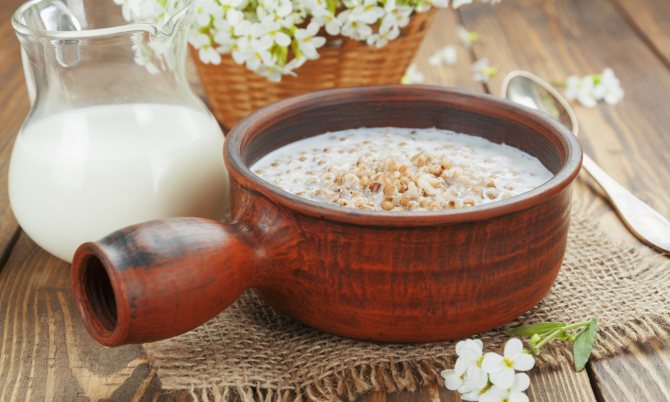
Boiled buckwheat is saturated with a huge amount of vitamins and microelements that can hardly be found in any other porridge.
Recipe:
Heat the cereal in a frying pan. Pour into a thermos and add boiled water or milk. First half, leave for a while, then pour the cereal completely and leave for the same time.
Oatmeal
Oatmeal restores intestinal microflora. This is its advantage over other cereals.
Recipe:
Pour the required amount of cereal with apple juice or natural yogurt. Leave the porridge for several hours. Over time, you can fill your body with an incredible amount of nutrients and vitamins.
Low fat cottage cheese
If you decide to start eating right and want your breakfast to be complete, then cottage cheese is an ideal option. It is one of the healthy foods for the first meal. It is rich in protein, full of calcium, iron and phosphorus.
Recipe:
Cottage cheese with a low fat content is most suitable for breakfast.
Mix cottage cheese and berries. Beat the products until an airy mass forms. Add honey or muesli if desired. You can also replace fruit with dill, then you will get curd cheese, which is suitable for sandwiches.
Eggs

Everyone knows that eggs contain many vitamins, calcium, potassium, magnesium and many other useful elements. If you systematically eat at least one egg during breakfast, the process of increasing immunity, stable resistance to stress, and normalization of metabolism will become clearly noticeable. Breakfast is also healthy thanks to egg whites, which are rich in carbohydrates, amino acids and minerals.
Recipe:
Lightly fry the tomatoes and half the zucchini in a frying pan. Separate the whites from the yolks. Beat the whites, pour 100 mg of milk into them and add salt to taste. Pour the resulting mixture over the fried vegetables. Sprinkle the omelet with dill.
Fruits and berries
It is difficult to imagine proper nutrition without fruits and vegetables. Moreover, they can be eaten in absolutely any form. Nutritionists advise eating fresh fruits and vegetables every day. Almost all of them contain useful substances. These ingredients also promote good mood and good health.
Yoghurts
This product, made at home with your own hands, helps improve digestive processes. For breakfast, it is better to eat natural yogurt without sweet fillings.
Recipe:
Cucumber yogurt smoothies give people a boost of energy for most of the day. Finely chop a few cucumbers and mix them with ginger and mint. Add yogurt, a liter of water and a teaspoon of honey. Beat everything with a blender. The cocktail is ready!
What not to eat and drink for breakfast

Remember that not all foods can be eaten for breakfast. There are foods and drinks that, when taken after waking up, can have a negative impact on our health. What's bad to eat for breakfast?
And yes, it won't include obvious options like soda or hamburgers and chips. Obviously, such a breakfast can only do harm. We tried to select products from which you would not expect a catch.
Citrus
Many people mistakenly believe that a glass of orange juice in the morning is the right start to the day, because it contains many vitamins and beneficial microelements.
This fresh juice really has a beneficial effect on the body, but not in the morning. The thing is that oranges, grapefruits, tangerines and other citrus fruits contain acid that greatly irritates the gastric mucosa .
If you consume such fruits or juices on an empty stomach, you risk getting gastritis or allergies.
Bananas
The composition of this fruit includes magnesium, and if you consume it in large quantities for breakfast, the cardiovascular system will receive a serious load .
The result is drowsiness and a feeling of weakness. It is better to eat a banana a few hours after breakfast.
Cold drinks
Everyone knows that in the morning on an empty stomach you need to drink a glass of water to start the digestive system. However, there is one “but”: under no circumstances should it be cold. The low temperature of the drink impairs blood circulation and slows down metabolism.
And if girls drink cold water or juice every day in the morning, they will begin to have problems with their menstrual cycle. Read more about how much water to drink per day and what it should be here.
Meat
Now we are not talking about boiled chicken breast, but about fatty meat - fried pork, chops. The fact is that the body spends a lot of energy to digest this product. And when he is half asleep, this is not so easy to do.
Therefore, if in the morning you are tempted by a delicious cutlet, then get ready for the fact that you will not be able to wake up and think about work for several more hours.
Quick breakfasts
Contrary to numerous advertisements that claim that they are incredibly nutritious and healthy, it is better to avoid them. This product does not provide any benefit to our body and, as paradoxical as it may sound, contributes to the gain of extra pounds .
Such breakfasts contain a lot of carbohydrates, which are digested very quickly and, as a result, cause attacks of hunger long before lunch. So don’t be surprised if you find yourself snacking on something all morning.
Yeast
We are talking about all products that contain yeast. This is especially true for baked goods. If eaten on an empty stomach, they can lead not only to bloating and discomfort, but also to disturbances in the digestive system .
Raw vegetables and yogurt
Avoid raw vegetables for breakfast. They contain acid that corrodes and irritates the walls of the stomach . Such a breakfast can lead to gastritis and ulcers.
Yogurt is also not the best breakfast. Not only will it not bring any benefit, but it can also cause harm. The benefits of yogurt on an empty stomach are minimal, since the hydrochloric acid in the stomach “kills” all lactic acid bacteria.
What harm can yogurt cause? Gastroenterologist Leila Bolatchieva claims that yogurt quickly leaves the stomach, which continues to work, secreting enzymes and hydrochloric acid. This way you can get gastritis and duodenal ulcer.
Remember that breakfast is an important part of the day and it should be beneficial. It is better to have a snack with yogurt 2-3 hours after breakfast or eat it for dinner (as an addition to something).
Eat it yourself: is breakfast as healthy as is commonly believed?
Breakfast is considered to be the main meal of the day. Various studies confirm that breakfast helps adults feel better and children learn better. However, recently many publications and studies have appeared that significantly downplay the role of morning meals. “Mel”, having dug through many scientific works, decided to find out whether breakfast is as healthy as is commonly believed.
Useful Mela newsletter twice a week: Tuesday and Friday
SUBSCRIBE
Let's discard situations in which a person is limited by diet or medical recommendations on nutrition. In some cases, it can actually be beneficial to skip breakfast. In addition, nutritionists do not have a consensus on the morning meal. Five different experts can give five different recommendations on what to eat and when, depending on what system (or, more correctly, ideology) they adhere to. We will try to understand how breakfast affects the body of ordinary healthy children and adults.
Why is breakfast so important?

Molecular biology and physiologist John L. Ivey from the University of Texas at Austin argues that the rest of the day depends on the morning meal. Breakfast has a positive effect on a person’s cognitive activity, and if carbohydrate reserves are not replenished in the morning, low blood glucose levels will negatively affect intellectual activity.
This is confirmed by specialists from the University of Milan, who analyzed several studies related to the effect of regular breakfast on children. According to these scientific works, those who skip their morning meals experience problems with short-term memory, alertness and decision-making. However, scientists have not found a clear reason why breakfast has a positive effect on cognitive performance.
John L. Ivey explains this by saying that breakfast allows you to instantly restore lost energy reserves and quickly raises blood glucose levels to normal after sleep. In addition, it replenishes glycogen stores in muscles and liver cells, which has a positive effect on performance.
A balanced breakfast provides a person with enough carbohydrates, which increases his physical activity and endurance throughout the day.
In addition, the scientist adds, eating in the morning immediately reduces the level of cortisol in the blood, a hormone involved in the development of stress reactions, the concentration of which increases just in the morning due to the body’s need to maintain metabolism throughout the night.
Breakfast according to Ivey also has a positive effect on the secretion of gastrointestinal hormones, some of which regulate appetite. If you eat a hearty meal in the morning, the feeling of fullness will persist for a relatively long time, and during the day a person will eat less. Thus, Ivy views breakfast as a tool for maintaining or losing weight. According to statistics cited by the scientist, 78% of people whose diet was considered successful (that is, the person lost more than 10% of weight and maintained the new weight for at least two years) regularly ate food in the morning. Interestingly, people who ate breakfast lost, on average, 50% more weight than those who skipped breakfast but consumed the same amount of calories throughout the day.
This applies to both adults and children. According to a study cited by researchers from the University of Milan, among 14,000 American children aged nine to 14 who skipped breakfast, 26.4% of boys and 25.3% of girls were overweight.
Finally, in adults, skipping breakfast can lead to chronic diseases. In 2013, Harvard scientists published their study: adults who skip their morning meals have a 27% higher risk of developing cardiovascular disease than those who eat breakfast regularly. Another interesting detail has also emerged: those who regularly overeat at night are at even greater risk. They are 55% more likely to develop cardiovascular disease than those who do not eat before bed.
Can these studies be trusted?
Last May, Indiana University School of Medicine pediatrics professor Aaron Carroll wrote a column for The New York Times questioning the conventional wisdom about the health benefits of breakfast and expressing skepticism about the results of these studies. Carroll himself does not eat until about noon, limiting himself to a cup of coffee. This is not a diet, it’s just that at 7.30 in the morning, when the professor leaves for work, he does not feel hungry and does not see any need to force himself to have breakfast. At the same time, he does not complain about feeling unwell.
As an example, the scientist cites exactly the same study by Harvard specialists, which, in his opinion, provides correct data, but the cause-and-effect relationships are broken. That is, there is no evidence that breakfast can reduce the likelihood of cardiovascular diseases.
Most scientists or nutritionists who talk about the almost magical power of breakfast limit themselves to observational studies. There is nothing wrong with this, but you need to remember that, firstly, they may not take into account certain external factors, and secondly, the morning meal itself is not a constant. This is not a drug that should have a clear clinical effect.
Roughly speaking, it is important not only whether a person has breakfast or not, but also what exactly he eats in the morning and throughout the day
If he eats a huge burger immediately after waking up, it is unlikely that this will have a positive effect on his health, and there is no need to conduct research to prove this.
As for other factors, researchers can often omit or present as auxiliary, but not influencing the results and conclusions of statistics, such parameters as social status, daily routine, the presence or absence of bad habits, genetic predisposition and much more.
It is logical to assume that children from wealthier families eat better and more often than those who grow up in disadvantaged environments. This was confirmed by employees of the University of Florida, who analyzed 85 scientific papers and found that children who eat breakfast regularly generally lead a healthier lifestyle.
It is also important that many popular studies generally have dubious scientific value. As an example, Aaron Carroll cites a publication on the benefits of cereals, funded by the breakfast cereal manufacturer Kellogg, as well as a similar work commissioned by one of PepsiCo's divisions. It is easy to assume that the conclusions were drawn exclusively in favor of morning nutrition.
5 options for the perfect lunch for a child
In 2013, the American Journal of Clinical Nutrition published an article that analyzed popular publications related to the benefits of breakfast. The authors of this paper concluded that as more evidence emerges about the benefits of eating in the morning, the more people believe in the magical power of breakfast, while the quality of the evidence remains the same. However, many of these publications suffer from flawed methodology, erroneous conclusions, or are simply based on misinterpreted data.
So should you have breakfast or not?
Of course, morning meals have a certain effect on the human body. But this effect is unique to each person. Aaron Carroll believes that the decision to eat breakfast or not should be a purely individual decision. If you feel hungry, it is better to satisfy it. But don't force yourself to eat as soon as you open your eyes in hopes that it will help you be more productive throughout the day. In the end, the body may resist, and if you feel sick all morning, you are unlikely to be happy and able to work effectively.
With children it's a little more complicated. You shouldn’t expect that a child who has not been particularly successful at school will begin to get straight A’s in a week or two by eating breakfast regularly. And vice versa: there is no need to fear that one missed meal will turn an excellent student into a fat loser. Eating breakfast can really help kids be more active throughout the day. Despite the fact that the research related to this does not look very convincing, it is foolish to deny that a hungry person will work more efficiently than a well-fed one. But here the main role is still played not by food intake itself, but by several factors, which, in particular, include the regime, the quality of food, and even mood.
Why you shouldn't eat sweets on an empty stomach
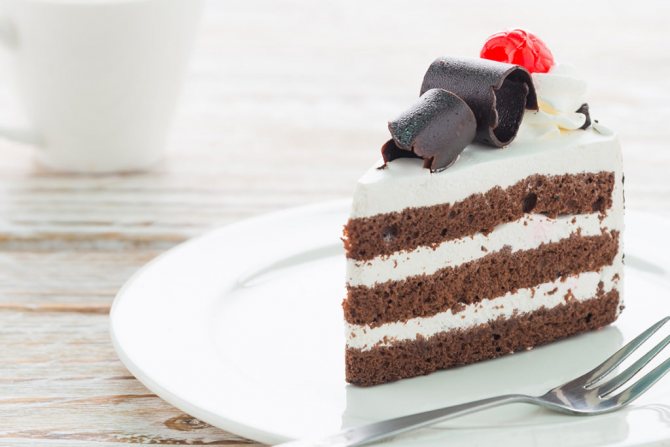
Sweets - tea with a delicious cake or cookies for breakfast - this is the second most popular option after sandwiches. Again, it's all about laziness. We don't want to waste precious time preparing something more healthy and substantial, so confectionery products come to the rescue.
In principle, there is nothing wrong with them; even nutritionists recommend consuming a little sweet in the morning. But remember that you cannot do this on an empty stomach. A sweet croissant and coffee is one of the most popular breakfasts in the world, but there are several reasons to treat yourself to it only from time to time.
- Firstly, such a breakfast guarantees that after an hour and a half you will want to eat something more substantial - the level of glucose in your blood will first rise sharply, and then also drop sharply.
- Secondly, surges in sugar levels affect productivity: after a sweet breakfast, you will not be able to work or train.
After waking up, the pancreas works at half capacity, so it will not be able to digest a large dose of sugar that enters the body along with a piece of cake.
The result will not be very pleasant: you will not only worsen the functioning of the pancreas, but also will not be able to concentrate during the day, because sweets consumed on an empty stomach have a negative effect on brain activity.
Sugar also increases the production of insulin, which is a big burden for the pancreas, which has just woken up. This can lead to diabetes.
If you want to learn about how sugar affects the human brain and what harm it causes, then follow the link (you can also find the main myth about sweets here).
Raspberries for breakfast will protect against diabetes and more

Scientists from Oklahoma State University (USA) recommend including raspberries more often in your morning meal - this will help reduce the risk of developing type II diabetes . This advice is especially useful for people who are at risk (overweight, obesity, genetic predisposition).
The norm is 125 g of berries. In addition, the researchers note, this low-calorie breakfast berry will also help lower blood sugar levels in those already diagnosed with type 2 diabetes.
Raspberries are also rich in polyphenols, which have been proven to protect us from cancer, heart disease and general inflammation.
Two new studies focused on the effects of berries on diabetes.
One study tested a group of 32 people with prediabetes. Scientists noticed: those who ate 125 g or 250 g of raspberries after a high-carbohydrate breakfast had a noticeable decrease in insulin levels.
But for those who started without raspberries in the morning, a large amount of carbohydrates provoked a sharp release of insulin, which remained high for a long time.
The second study showed that in diabetics who ate raspberries for breakfast along with other foods, inflammatory markers and blood glucose levels decreased after just 2 hours!
What does a proper breakfast look like?
A nutritious breakfast is a key element in a healthy eating program. Properly selected foods will, firstly, help jumpstart metabolism, and secondly, provide the body with energy until the next meal. Nutritionists advise that your morning menu should be composed of foods rich in proteins, complex carbohydrates, healthy fats and fiber.
Boiled chicken eggs, low-fat milk, natural yogurt, and cottage cheese can serve as a good source of protein for breakfast. It is useful to get carbohydrates in the morning from porridge and a few slices of whole grain bread. To restore the reserves of fatty acids necessary for the body, it is useful to include avocado and a little olive oil in breakfast.

Excellent options for the morning include oatmeal with fruit and yogurt, fruit salads, fried or boiled eggs with vegetables.
Nutritionists call protein food an important part of a healthy breakfast. Proteins perfectly satisfy hunger and keep you feeling full for a long time. That is, after a protein breakfast, a person remains full until lunch, thereby avoiding extra calories in the form of unhealthy snacks.
The most popular protein breakfast is chicken eggs. By the way, in terms of calorie content, two eggs correspond to one medium loaf. But people who choose the second option for their morning meal are more likely to suffer from obesity and high cholesterol.
Scientists from Harvard University studied the morning diet and weight of more than 17 thousand people. Scientists found that the least overweight people in the group ate cereals in the morning.
The benefits of breakfast
| Energizes |
| Good for your figure |
| Provides the body with nutrients |
| Important for brain function |
The benefits of breakfast are enormous, it is very important for your body, refusing it can lead to numerous problems. Do not neglect it if you do not want to harm your health. And also remember what you can eat for breakfast and what you can’t.
The best food in the morning is porridge. Dishes made from buckwheat and oatmeal are considered especially healthy. It is better to cook them without sugar using water or skim milk.
Was there anything you didn’t like about this article, do you have anything to add, or did you find an error? Be sure to write about it in the comments. Not a single comment will be left unattended!
Article updated 11/29/2020
How to choose breakfast foods
To make your morning meal truly healthy, it is important to choose the right ingredients for it. A healthy, balanced breakfast can consist of several food groups, including fruits, vegetables, grains, proteins and dairy products.
You can often hear that people refuse their morning meal only because they don’t have time to cook. In fact, there are many delicious and healthy recipes for morning dishes that will take no more than 5 minutes to prepare.
Options for a quick but healthy breakfast:
- whole grain sandwich with feta cheese or other cheese, favorite drink;
- scrambled eggs, tomato, rye bread sandwich with ham;
- boiled eggs, a slice of bread, a banana;
- fruit smoothie with natural yogurt;
- a slice of baked fish, a sandwich with cream cheese;
- whole grain cereals with fruit and milk;
- natural yogurt with fruit.


